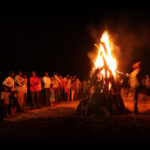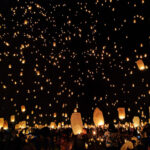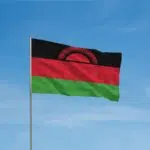The Lantern Festival is held on March 3 this year and is an important element of Chinese and Taiwanese culture. Lanterns carry huge cultural significance in Chinese culture and since Taiwanese people belong to the same culture and tradition, lanterns carry deep cultural meaning for them as well. The practice of lighting lanterns originates in Buddhist traditions more than 20 centuries ago. The Taiwanese people adhere to these practices to this very day and honor the traditions of their ancestors. The Lantern Festival is an annual celebration that marks the end of New Year celebrations across Taiwan. It is celebrated on the 15th day of the first month in the lunar calendar. This auspicious carnival is a major tourism hotspot and is organized by the Tourism Ministry of Taiwan. The weeks-long observation brings people of Taoism & Buddhism faith together, as they light the lanterns in hopes of a better future. Rice dumplings are distributed in the streets and the people of Taiwan pay tribute to the centuries-old traditions.
History of Lantern Festival Taiwan
The Lantern Festival symbolizes peace, hope, and new beginnings. Traditional red lanterns symbolize prosperity and good fortune in Southeast Asian culture. The sky lantern is the center of attraction of the Pingxi Lantern Festival and without it, there would be no festival to celebrate. We can as well trace the beginnings of the Pingxi Lantern Festival to the events that made the sky lantern a Taiwanese cultural heritage. Sky lanterns are the miniature version of a hot air balloon. They are made out of paper with a wire construction for the fire that lifts the lantern.
According to historians, the sky lanterns first came into use in the third century B.C. in China as an essential warfare and military protection tool. It was believed to have been invented between 220 A.D. and 280 A.D. by Zhuge Liang, a chancellor and military strategist during the Three Kingdoms period. As the chancellor was also known by the courtesy name, Kongming, the sky lantern was also referred to as kongming lanterns. According to Chinese myth, Liang first used sky lanterns to send an S.O.S. message when enemy troops surrounded him.
How the sky lanterns became commonplace is open to many speculations. Local tradition believes sky lanterns appeared with the arrival of Chinese settlers in 1821. During the Qing Dynasty, the Pingxi district was one of the many districts difficult for the provincial government to control and protect as they were remote and far from the seat of power. Therefore, to protect themselves during the post-harvest season, the villagers would hide in the mountains and leave behind their strong men to defend their village. At the end of all this, the men would release sky lanterns to inform the villagers that they could safely return home. This act eventually evolved into the annual Pingxi Lantern Festival.
In 1990, the Tourism Bureau began deploying civilian and local government resources to host the sky lantern celebrations, turning them into a celebration of tradition and increasing their popularity.
The world’s first Lantern Festival is believed to have been introduced by Emperor Ming of the Han Dynasty who was a firm believer of the Buddhism philosophy. When Emperor Ming saw a group of Buddhist monks decorating temples with lanterns on the 15th day of the first lunar month, he commanded the entire palace and temples to be lit with lanterns.
By combining national and regional resources, the tourism industry of Taiwan established its first Taiwan Lantern festival in 1990. Some people also refer to it as the Yuan Xiao Festival. The major aim behind this event is to promote the traditional culture and folklore among the common people. The earlier civilizations would organize an event with firecrackers to pay tribute to Guan Yu for his achievements and valor.
Many folklore is attached to the celebration, a prominent one is the story of Yuansiao, the maid. The legend says that a maid by the name of Yuansiao was trapped under the thumb of Emperor Wu. She was forbidden from ever seeing her family. When a minister took notice of her condition, he hatched a plan to reunite the poor girl with her family for one night. He told the Emperor that great perils threaten him and his health, lest he lights up the city with lanterns on his birthday. The Emperor gave in to the request and allowed for the procession to happen. On his birthday, every worker was allowed to leave the palace to help with the ritual, which gave Yuansiao the maid an annual opportunity to be reunited with her family.
This event was usually held in the holy temple of Wumiao located in the District of Yanshuei. The highlight of this event is the Fengpao ceremony. This is when numerous firecrackers are burnt and hung in the temple of Wumiao on a wooden stand at a great height. This ceremony commences at six in the evening and is carried out till five the next morning. Numerous people attend the event to witness the popular Fengpao ceremony. The fireworks display attracts many tourists, which resembles the image of hundreds of bees released from a hive.
Lantern Festival Taiwan timeline
The very first lanterns are made with bamboo and wheat-straw frames.
Releasing lanterns becomes a common ritual in Southeast Asia.
The Chinese start using paper to make lanterns.
The Pingxi villagers start using sky lanterns as a signal of safety after bandit attacks.
The Tourism Bureau turns the practice of releasing sky lanterns into an annual event for the lantern festival.
Fodor’s, a renowned travel guide company, includes Pingxi Lantern Festival in its 15 Festivals To Attend Before You Die.
Lantern Festival Taiwan FAQs
How is the Taiwanese Pingxi Lantern Festival celebrated?
The Pingxi Lantern Festival is celebrated in the Pingxi district of Taipei, Taiwan. The festival is usually three days or one week long, with the main celebration happening on the night of the first full moon of the Lunar New Year. On that night, locals and foreign visitors release sky lanterns with their hopes and wishes written on them to the sky.
What do sky lanterns symbolize?
Sky lanterns have different meanings depending on the shape or color. That could include happiness, wealth, fame, fortune, peace, and forgiveness.
Why is the Pingxi Lantern Festival celebrated?
It honors deceased family members and aims to promote reconciliation, peace, and prosperity.
Lantern Festival Taiwan Activities
Make a sky lantern at home
Making lanterns at home is not as hard as it seems. All you need to make them at home are some sheets of paper, metal rings, candle wax, sticky tape, and pieces of string. Moreover, you can make them with your favorite color combinations and decorate them with different ornaments and writings. You can write your name or a special message on the lantern.
Make traditional Taiwanese steamed cakes
Taiwanese love to make steamed cakes (niángāo) on special occasions. The cake symbolizes peace, harmony, and prosperity. A savory version of the cake is also popular, which is prepared from rice flour and eggs. You can pan-fry both sweet and savory versions of the cake and enjoy them later as a leftover snack.
Learn Taiwanese Hokkien
Mandarin Chinese is one of the toughest languages to pick. A simpler language to learn is Taiwanese Hokkien. Learning Taiwanese Hokkien as a second language can be fun if you get the right tutors and learning resources. You can enroll in an elementary spoken Taiwanese course or watch tutorials online to get familiar with the language.
5 Amazing Facts About Sky Lanterns
They're of three types
There is the hanging lantern, floating lantern, and flying lantern, and each is used in different festivals.
Chinese sky lanterns are mostly red
The sky lanterns used in China are usually red as they symbolize warmth, happiness, and good fortune.
Hong Kong holds the lantern display record
The fish-shaped lantern sculpture displayed at the 2011 Hong Kong Mid-Autumn Festival event holds the Guinness World Record for the largest lantern sculpture.
They come in different shapes and sizes
It's possible to find sky lanterns in all shapes and sizes, including custom ones like hearts, pumpkins, and football.
They're used in all kinds of celebrations
Aside from festivals, sky lanterns are used at weddings, birthdays, casual parties, and other celebrations.
Why We Love Lantern Festival Taiwan
Pingxi Lantern Festival promotes reconciliation, peace, and forgiveness
Depending on the shape and color, releasing the sky lantern can have different meanings to the releaser. By letting go of the lanterns, people could be letting go of their anger and hatred and embracing peace and reconciliation. The sky lanterns may also be a prayer for wealth, happiness, and fortune.
People of all ages can join in and enjoy the celebrations
Releasing lanterns in the air not only looks visually stunning but is also a great way to create some precious memories with your loved ones. Making paper lanterns from scratch and then launching them in the open air is a great activity for people of all ages. The entire family can get involved in this fun celebration, especially during the holiday season.
We can enjoy authentic Taiwanese food
Authentic Taiwanese desserts are something that is not easily available everywhere. The Lantern Festival is incomplete without relishing mouthwatering Taiwanese delicacies such as douhua (tofu pudding) and steamed cakes. Therefore, during events like the Lantern Festival, we get to taste those traditional desserts that are only available on special occasions at Taiwanese restaurants.
Lantern Festival Taiwan dates
| Year | Date | Day |
|---|---|---|
| 2024 | February 24 | Saturday |
| 2025 | February 12 | Wednesday |
| 2026 | March 3 | Tuesday |








































